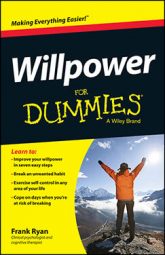What’s the best diet to enhance your willpower? Generally, sustaining glucose levels for longer rather than shorter periods is crucial to maintaining willpower, so you want to eat foods low on the glycaemic index. If, for example, you’re striving to remain a non-smoker, you need the endurance of a marathon runner more than the power of a sprinter.
Willpower enables you to control the choices you make, and high-glycaemic foods can sometimes be the right choice. If you’re feeling exhausted at the end of a long working day and dinner is two hours away, a bar of chocolate can sustain you (if your goal is to quit chocolate, ignore the last sentence!).
If you’re approaching the end of a long drive, a pit stop for coffee and something sweet may be the right choice. A boost of glucose may help sustain your willpower for the last leg of the journey, and reduce the likelihood of you getting a speeding ticket because of poor control over your speed – an example of willpower failure.
Maintaining willpower increases the energy demands on your brain. Glucose, a product of carbohydrates, is your brain’s favourite energy source. By carefully choosing foods that release glucose over relatively shorter or longer periods – typically ranging from 15 to 20 minutes to perhaps 1 to 2 hours – you give your brain what it needs to take on and win the willpower challenge!
Nature’s delicious secret is dark chocolate containing more than 70 per cent cocoa. This has remarkable health-giving properties. It’s rich in antioxidants, omega-3s and important vitamins and minerals such as potassium and magnesium. It also contains phenylethylamine, the same chemical your brain releases when you fall in love! Like other types of chocolate, dark chocolate contains fats and some caffeine, so don’t overdo it. You can, however, use dark chocolate, perhaps a small amount each day, as a way of rewarding yourself, or just as pure self-indulgence!

